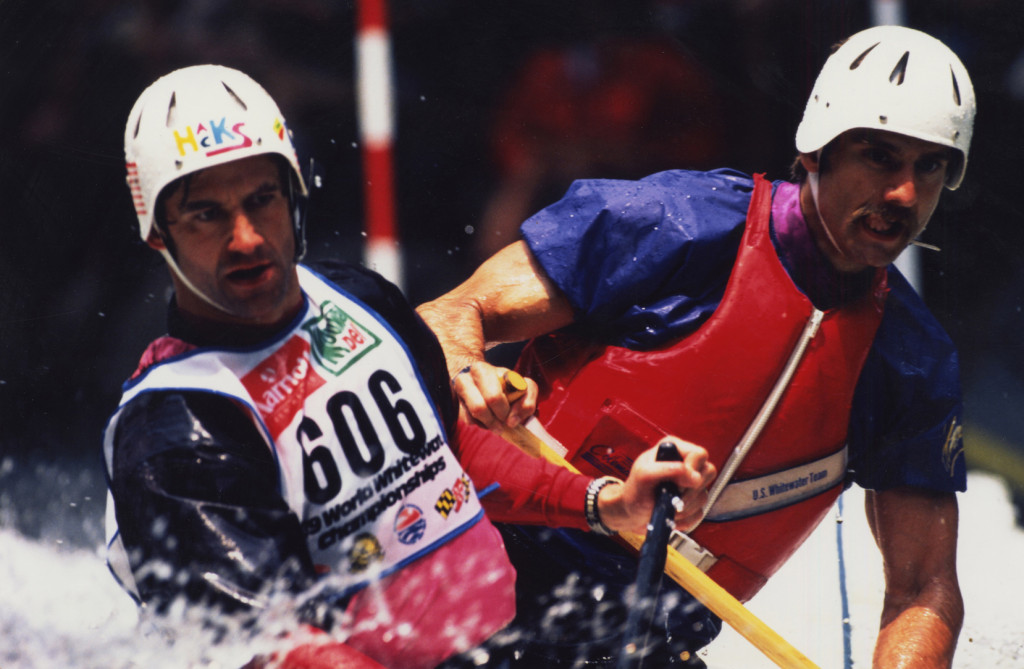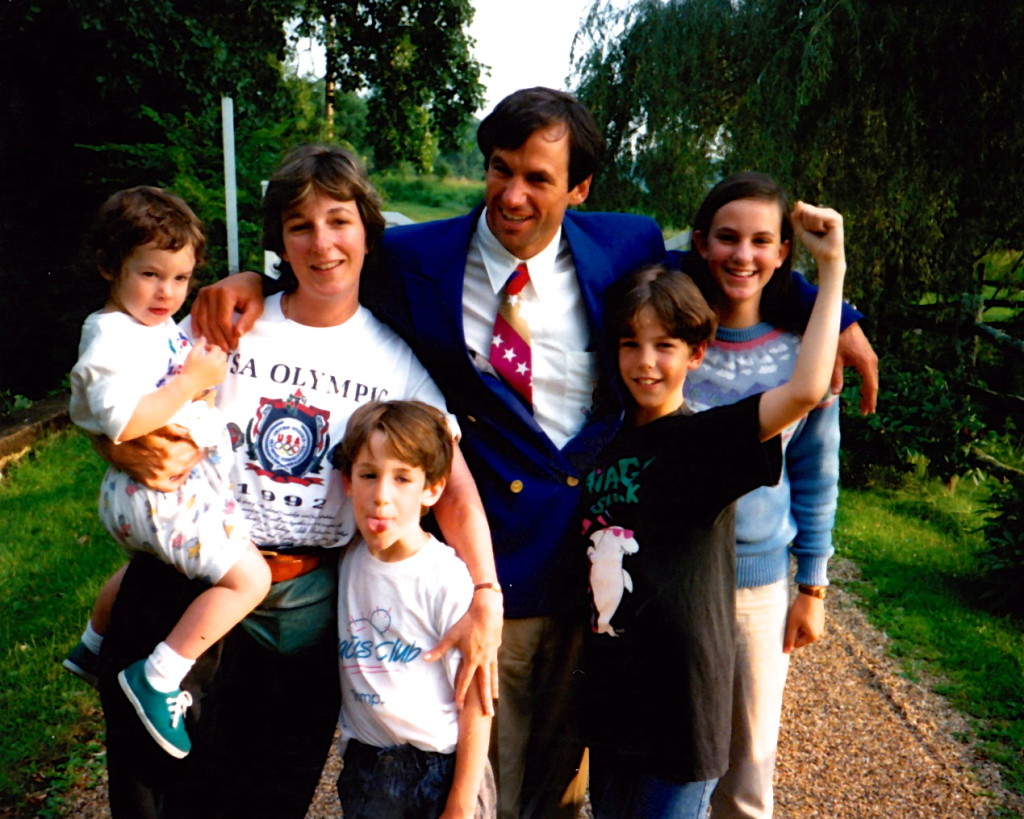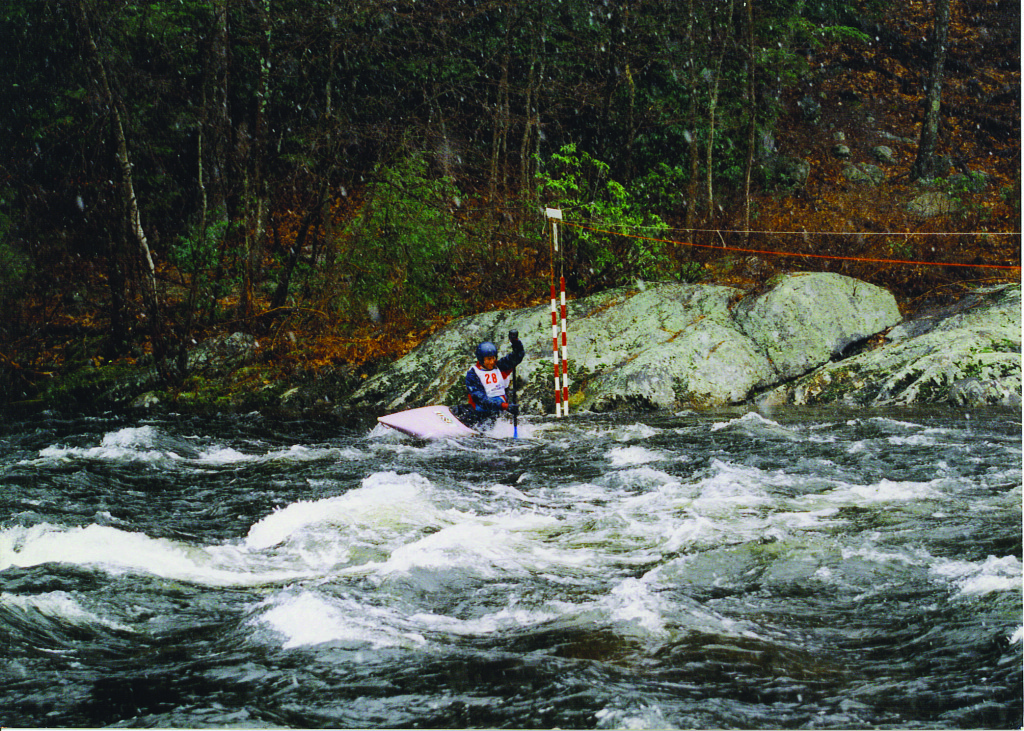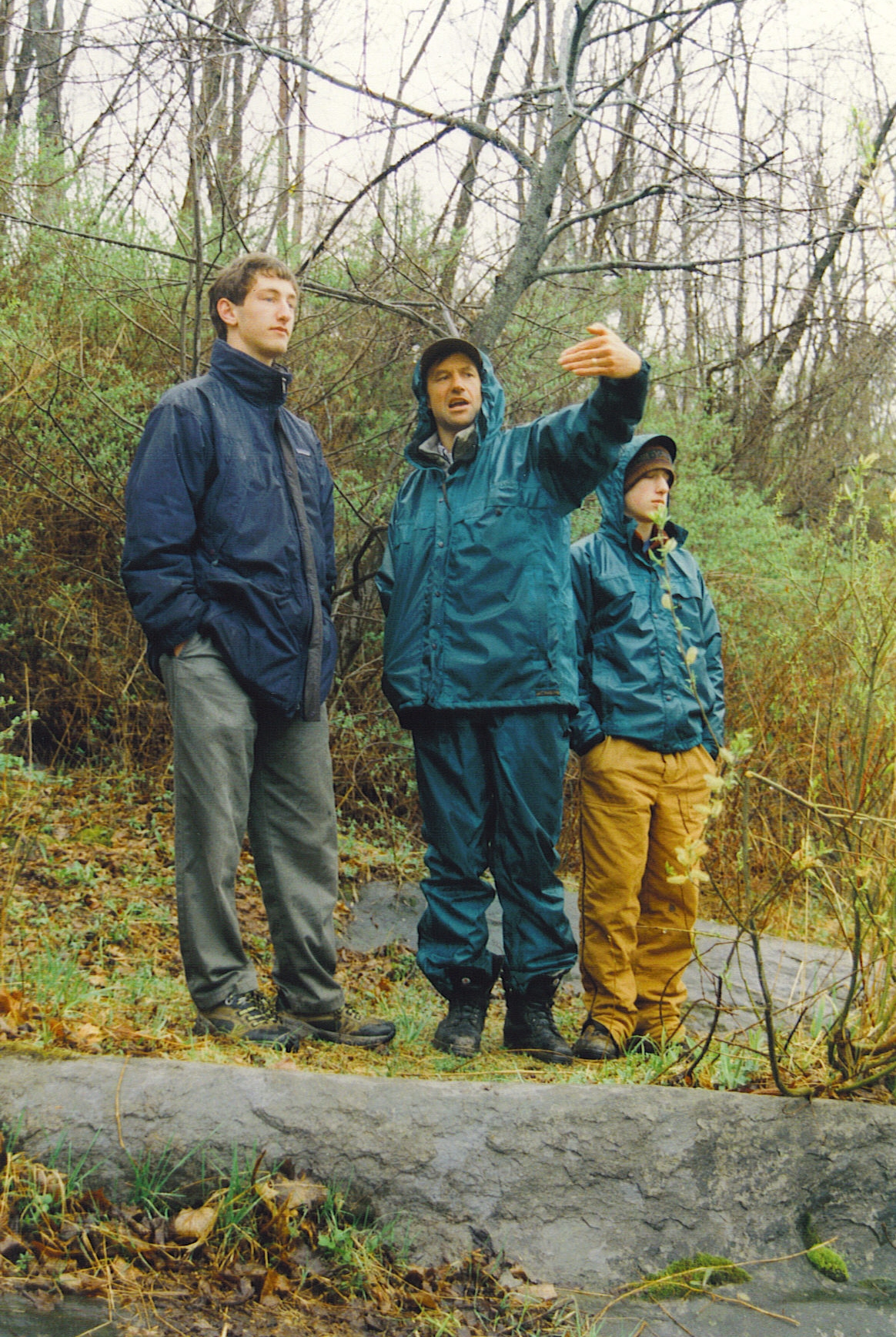Once, at a boater party in Washington, D.C., I failed to recognize a companion with whom I’d spent hundreds of hours paddling the Potomac. He was a perfect stranger until I picked out the small radius of features normally peeking from between skull cap and neck gasket. I’d been so used to seeing him swathed in the particular amalgam of colors and insignias — of his drytop, PFD, pogies — that visually comprised his identity in Mather Gorge that stripped of gear he was a perfect stranger to me. Such misrecognition is a common joke among boaters, who, like the plumed, bejeweled sailors among Nathaniel Hawthorne’s dour Puritans, seem incongruous on land.
Yet for the first three years that I knew New England’s most famous boater, I knew James Patrick McEwan only in street clothes.
I first met Jamie McEwan just as I was set to end my first year at boarding school. It was June of 1997 when he arrived on campus of the Hotchkiss School one Saturday afternoon to take his eldest son Keith and me for a finals study break to the movies. Keith was a “day student” — he lived in town and slept at home. Though his father drove him to school most days, I had never met Jamie until that afternoon, when I saw his navy Mazda van — adorned with boat rack — park amid Benzes and Beamers, and across the immaculate lawn, crowded with Westchester boys playing lacrosse, and Darien girls sunning themselves and on which I wasn’t sure that I myself belonged yet, Jamie McEwan strode easily.

Jamie McEwan was handsome. That much I remember thinking. Although I’m able to vaguely discern which men are considered good-looking — which men have a swagger, or a certain magnetism about the face, or a resemblance to masculine archetypes — the deduction is always something of a mathematical exercise. But that day on the quad? I could tell immediately. Perhaps I was star-struck? I’d already heard all about his father from Keith. Jamie McEwan had won a bronze medal in the 1972 Olympics in a sport called whitewater slalom, and then, after the sport had been dropped from the Games for twenty years, returned to finish fourth in the 1992 Olympics when he was 39. Here was a man walking toward me who’d walked into the stadium five years before with Magic, Bird, and Jordan. What’s more: he looked the part. He looked like a movie star — something of the Harrison Ford-as-Indiana Jones look: tall, broad shouldered, square jaw flecked with stubble, tanned, Oxford shirt under not a leather jacket but a technical jacket that spoke of adventure. I knew he’d just come home from a remote river trip in British Columbia, that he’d captained the Yale wrestling team and majored in English and written books. There were other fathers there on the quad, red-faced bankers and brokers mincing around luxury cars in double-breasted blazers and tasseled loafers, the kinds of fathers I saw every weekend on campus, but Jamie McEwan moved among them easily, and came straight up to us. His handsome face curled into smile — right lip pulled up at the corner — a smile that seemed to understand everything about that particular quad but also wanted to know very much what you thought of it too — and Jamie McEwan held out his hand.
“Hi, Alden.”
***
Much later on, a visiting speaker asked our senior class for a show of hands: “How many of your fathers do exactly what they always dreamed of doing?”
Somewhere off to my right, I saw a lone hand raised, high and insistently, and Keith leaning forward in his seat.
***
By sophomore year, Keith and I shared a high-ceilinged room in Coy dormitory and I still only knew Jamie in street clothes. Though by then I’d become veteran of many off campus outings with the McEwan-Boyntons: to their gate-guarded family compound in town, to their lake house near the state border, to the movie theater in Winsted or in Millerton. Jamie was our driver, holding forth in the new-smelling, leather-lined Mazda van about life, literature, film, and politics. What struck me from the first was the informal, almost brotherly relationship that Keith and his younger brother Devin enjoyed with their father. It was not unusual for Jamie to pick up Keith at Hotchkiss in the evening, only to idle outside Coy for 20 minutes, discussing with Keith some work of literature or a film they had just seen, teasing out some ambiguity until they understood it together. While I got along well enough with my own father, our relationship was decidedly not “brotherly,” and an appreciation for any sort of ambiguity — particularly concerning the process of parental decision making — was not on the paternal syllabus. Mr. McEwan — as I called him then — was much different.
“Alden,” he’d say, “call me Jamie.”

Jamie didn’t work a conventional job like my father but wrote articles and fiction in the converted barn he shared with his wife, the author and cartoonist Sandra Boynton. He had been a stay-at-home father and seemed to have all the time in the world for his family. He home schooled both Keith and Keith’s sister Caitlin at various times, and during Keith’s eighth grade year bid his son study the complete works — as Keith once related to my mother’s lasting approval — of Dave Barry. The advent of social media has brought forth a remarkable trove of photos of Jamie McEwan-as-father: here he is, brawny and rakish, entertaining a birthday party of children with a bubble maker, there he is, dripping wet and helmeted, holding his daughter between runs at the Nationals, or posing with progeny in Halloween costumes (tuxedo and ice axe – “a social climber!”), or blowing a kiss to his wife from the podium at the World Championships. Family man he was, Jamie McEwan.
Yet there was more to my admiration of Jamie than his good-nature and his kindness. At Hotchkiss, the pressure of an Ivy League acceptance was in the air from freshman year. Entry into a school like Yale, where Jamie had gone, stood as the ultimate goal of our endless jockeying for academic position. Yet as anyone who knew him would affirm, when Jamie McEwan looked at you, no matter who you were, you mattered completely. And for me, 15 years old and thoroughly undistinguished, to feel worthy of the attention of a man who was not only a success, but who had who had gone to Yale was to feel as though I — whose parents who had not gone to traditional college — had finally, in some important way, been invited into the tent.
In the fall of 1998, during my junior year, I became conscious that I hadn’t seen Jamie in some time. Keith had said something about his father going on a trip – “to kayak a river in Tibet that’s never been done before.” I only knew that I hadn’t seen him in quite a while.
Then one rainy November night, as Keith and I studied in our room during mandatory study hall, there was a knock. We looked up from our books. Nobody knocks in boarding school except teachers or parents.
“Yeah?”
“Keith?” came a hesitant voice. “Keith, I need to bring you home.”
The door opened. There, sopping wet and sunk in some distant melancholy, stood Jamie McEwan.
“Mr. McEwan,” I said. “You’re back!”
“You know, Alden,” he said, looking as though he was about confess something of inestimable anguish.
“You really have to start calling me Jamie.”
I could not have known it, but at the time Jamie was just a week removed from the long, sad trek out of the Himalayan river gorge where his best friend, former US Slalom Team member Doug Gordon, had drowned on what the media was beginning to call “the Mount Everest of Rivers”: the Yarlung Tsangpo. For the past week, Jamie McEwan had been hounded — by the press, by boaters, and by his own conscience — for his team’s decision to put on a river that, in the words of one chronicler, was “considered beyond the means of what humans could do in a boat.”
He was shaken. “I had believed in Doug’s judgment,” Jamie wrote in his journal, “. . . I had staked my life on that belief, more than once. Once that was swept away — literally and figuratively — I doubted everything.”
Looking back, I wonder if Jamie considered quitting paddling — the sport that had defined his life for thirty years. Did such thoughts enter his mind as he turned back for a last look at the Tsangpo? Or on that sad, rainy night in Connecticut?
Not long before he drowned on the Tsangpo, Doug Gordon wrote an article in American Whitewater that wrestled with this same issue, prompted by the drowning of Rich Weiss, his friend and Jamie’s:
“Will I teach my son to paddle? Absolutely. And I wager Rich would have also. The joy, the satisfaction, the personal growth I’ve experienced through paddling and the spectacular places I’ve seen are well worth the risk. But let’s not pretend the risk isn’t there” (American Whitewater, 1997).
But he didn’t quit. I would not be writing this article if he had. But why didn’t he? Maybe he reasoned that the Housatonic was no Tsangpo? Maybe he wanted to move on from Gordon’s death by teaching others to paddle? Or maybe, inspired by Gordon’s words, he wanted to spend more time with his sons doing what he loved most? One year after returning from Tibet, Jamie McEwan entered the office of Rick Delprete, Hotchkiss Athletic Director, and proposed, for what I think was the first time in his adult life, to formally teach paddling.
That March, six Hotchkiss students launched on the Housatonic River. For me, a skier and a mountain biker, the decision to quit lacrosse for paddling was easy. The promise of spending time with Jamie and with Keith and Devin — who also joined — was part of it, but to quit lacrosse — the consummate prep-school sport — for the freedom of the river began to seem like just the door into life that I sought at 18.
The program’s future would be short: Jamie — already a Hotchkiss wrestling coach — would end the program in 2002 after two seasons. I learned to paddle during a brief window when New England’s greatest paddling legend devoted himself to teaching the sport that he loved, in the wake of his greatest tragedy, and I learned alongside his two sons.
Now, learning to paddle whitewater from a McEwan is in fact quite common on the East Coast. But not from Jamie — from Tom McEwan, his older brother, a paddling pioneer himself and a revered paddling instructor in the Washington, D.C. area. There are hundreds of American boaters — most of the middle class kids from the DC suburbs — who came under Tom McEwan’s spell at summer camp — Valley Mill or Calleva — and got so taken with Tom and with the sport that they gave whole swathes of their twenties to lactic training on the Feeder Canal, dreams of racing in Europe, laps on the Upper Blackwater and Green Narrows. I met lots of these guys on my way up through the sport: many of my generation’s best.
“Wait,” they would say, “you mean Tom McEwan taught you to paddle.”
“No,” I would tell them, “Jamie.”

Every afternoon during the spring of 2000, Jamie McEwan, towing a trailer of boats, met us in front of the massive Hotchkiss main building to drive us 15 minutes over the ridge to the Housatonic River, where we would spend an hour and a half practicing slalom gates at the training site that Jamie had built along with Gordon and other US Slalom members in the 1980s. Jamie held court in the van in his genial way on the drive over and the conversation often ranged to film, or to literature, or to politics — in which Jamie was a cheerfully staunch libertarian (“Can we . . . ?” “Yes!’” — as Keith once summed up his father’s political philosophy.) He drove us to the Punch Brook Slalom, and to the Covered Bridge Slalom. At Jamie’s funeral, Bruce Lessels, owner of Zoar Outdoor and Jamie’s former training partner, reminisced about the “Volvo Forums” — car rides in Jamie’s Volvo from the Housatonic to the Deerfield Valley to train slalom in the mid-1980s, during which all matter of topics were debated and discussed. I never realized until then that all those literate, jovial car rides with Jamie had such a long history, except that by the time I came around, the main participants were not Jamie’s friends, but his children and their friends. He seemed to enjoy it just as much.
Whenever I could, I’d sit right in the front seat next to Jamie in order to direct the conversation to the paddling lore that I increasingly craved. That spring my irrevocable enchantment with whitewater came about not so much because of what Jamie McEwan taught me, so much as by the romance with which he spoke of this wondrous sport and of his storied past in it: of Chris Spelius gluing his spray skirt on before leading Jamie down the Niagara Gorge, of Walt Blackadar disappearing behind Jamie in Lava Falls and reappearing at the bottom, of Richard Fox, “the most arrhythmic paddler — also the winningest” hitting Gate 1 at the ‘89 Worlds and storming back to win, of the great Jon Lugbill brought down by a fatal penalty in the ‘92 Olympics, or of that mystical, haunting gorge in the Himalayas that he sometimes still dreamed about putting on again (“Why? Just to be there.”). Though his technical instruction that spring was flawless and his rolling advice judicious, Jamie McEwan did not so much teach me to paddle as he inspired me to be haunted by waters. His tutelage brings to mind the old adage: education is not the filling of a pail, but the lighting of a fire.
Yet he did more than tell paddling stories. The work he put into the program was real. No doubt just convincing a stringent prep school to sign off on the liability had been a chore. Jamie — with Mark and Jenifer Clarke’s help — also furnished a massive amount of gear — not just boats and paddles for seven, but wetsuits, booties, jackets and gloves for seven. He also maintained constant upkeep on the forest of slalom gates and wires that hung across the Housatonic: never an easy feat given fluctuating river levels and windy days. Whatever modest coaching stipend he received in no way covered all the work he put in (did Hotchkiss cover his gas? I can’t imagine they did.) Only now do I realize how much time and effort he put into that program when he absolutely didn’t need to and could have been excused for not wanting anything to do with rivers.
But that was not who he was. His generosity extended beyond we fortunate seven and to the paddling community as a whole. The famous River House — a second house Jamie bought on the banks of the slalom course in Falls Village — he furnished rent-free to training racers for twenty years. Back in 2000 it was mesmerizing: filled with paddling posters and memorabilia (a signed poster from Corran Addison: “To the River House HACKS — you guys are bunch of goobers!”) and occupied by three boaters in their early twenties: Scott Barnes, Ted Devoe, and John Hagner. It was my dream house at the time, a paddling clubhouse which foreshadowed several of the boater establishments in which I spent my own early twenties in Brookmont, Maryland. And it was all possible because of Jamie. Once he quite literally gave me the (paddling) shirt off his back — the very same short sleeve paddle jacket, I’m quite convinced, that he’d used in the ‘92 Olympics. Fifty dollars was the price he charged me for my second C-1: “Just to make the transfer of ownership seem real.” My first boat had been free.
That a few years later I began to chase Jamie himself on the racecourse is not surprising, because Jamie McEwan gave several generations of aspiring racers the chance to challenge a real-life Olympic medalist. Though both Devin and I nipped at his heels, Jamie thrived on it, graciously offering advice and never once giving an inch. It was a big moment for me when I finally beat him, but I am awed now to think just how many other boaters must have had shared this goal. At Jamie’s funeral, Bruce Lessels spoke of how he had been so vexed in the early 1980s at not being able to beat “this old guy — who was probably all of 30.” Just a few years before that, it had been the now-famous D.C. C-1s — Jon Lugbill, Bob Robison, and Davey Hearn — who had measured themselves against Jamie before becoming World Champions themselves. Lecky Haller, Jamie’s Olympic C-2 partner, wrote on first paddling with him, “I was awed to be in the same boat as America’s only whitewater Olympic medalist at the time.” But although we chased him, we never quite caught him. The United States has not won an Olympic medal in C-1 Slalom since 1972.
The last time I saw him, Pete Schwaikert (a Hotchkiss classmate and fellow McEwan protégé) and I drove out to Jamie’s house at Christmas. We stood around in the converted barn studio — Pete, Devin, Keith, Jamie and me. And though Jamie — taller than any of us once — was shrunken by the cancer that would ultimately take his life, on that winter morning, as he stood around with his two sons and with two others whose lives he had so influenced, he seemed to stand taller than when I had first met him.
Later we paddled the Housatonic together but without him. As I took strokes where I had first taken strokes, alongside those who were there, I thought of all the rivers we had run since 2000. And I thought too of all the people we had taught or would teach to paddle. Or speak to about the romance of rivers. In time they would set their boats in rivers we had not, and in time they would paddle together without us. Then it occurred to me that there are two kinds of accomplishments in life: those for which we win medals, and those for which we do not. Jamie McEwan inspired us because he accomplished the former. But he lived fully and he lived well because he accomplished the latter — more than he himself could have ever known.
Now we paddle without him, but always because of him.
